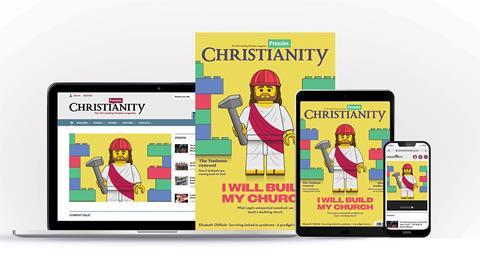
1. It is a great conversation starter
When I went to a preview screening of The Shack I asked one of the reviewers for a major media outlet why they had decided to review this particular movie.
"I read the book" she told me. "Do you read a lot of spiritual books?" I asked. "Oh no, but I liked the questions this book was wrestling with."
I have met other people with similar reactions. Never mind if you think the book is poorly written, a thick-cut sandwich with a slice of plot each side to hold in the theological conversational filling; people I have met enjoy the opportunity to struggle with the questions. Others skip the middle section, and read the beginning and end – and still they get the questions being raised. And so this book has attracted 22 million readers, many of whom may never have read a Christian book before. I think the same will be true about the movie. This major Hollywood release, with actors that people will recognise, may not be everybody’s cup of tea, but it will still be a big deal, and a big conversation starter.
2. This film forces us to question our mental pictures of God
All of us have a skewed view of God in some way. Some of us picture our fathers or grandfathers or vicars when we think about God. Some of us have spent our whole lives imagining God as we once saw him pictured in a children’s book or art gallery. Many of us unconsciously assume that God is a white man surrounded by clouds looking not dissimilar from Father Christmas. Numerous films have tried to unsettle this view and challenge our mental image – for example Morgan Freeman played God in Bruce Almighty or a child played God in Exodus Gods and Kings.
The Shack controversially portrays God the Father as a black woman called "Papa" which is bound to get a feisty reaction. God the Son is portrayed as a Middle Eastern man, and God the Holy Spirit as an Asian woman, although the three members change their appearance at different parts of Mac's life.
Despite the challenges involved, I did find impressive the way both the book and the film attempted to depict the Trinity as a welcoming, friendly, laughing, multicultural community. So many films beloved by Christians don’t even attempt to portray the Trinity and don’t receive any critique for this. Perhaps portraying God as a solitary individual is no less misleading than portraying two out of the three members of the Godhead as women.
3. This film forces us to check our theology.
I had the privilege of meeting up with the director, Stuart Hazeldine. Stuart is a keen thinker, who reads widely and has spent time exploring his theology. He is open about his Christian faith and he goes to a mainstream evangelical church that you will have heard of. Stuart was open with me about how directing the film took him on a journey in his understanding of salvation.
When he first spoke to the author Paul Young about making The Shack, he remembered saying "I really believe that it beautifully articulates God's heart towards his creation but I don't know if it really articulates his whole character." Then, Hazeldine recalled, "he just shrugged at me and said ‘it’s okay man - you're on a journey’ and I kind of had this gut instinct that I should do it. I felt this is a really important film to put out there especially at a time when people are increasingly blaming religion as the primary source of hatred and division."
But it was actually during postproduction that Hazeldine read more widely and deeply into theology than he had since he was a teenager. He said: "I ended up in a place where I personally feel more comfortable than I've ever been to say that I think ‘the God of the Shack’ is the whole character of God for me. I would happily debate someone on that."
Stuart and I had a helpful conversation about that journey and how his views had changed. I asked him whether he felt the movie would frustrate people who felt that God’s justice was overlooked by focussing more on his love. Stuart explained that that had been his concern with the book, but that he was wary of what he described as the denominational echo chamber. "You know you think that you're reading all these books and hearing all these sermons by all these different authors but actually they broadly agree with each other and you really aren't getting exposed to other perspectives. You feel like somehow someone's going to change your mind and you're going to end up in apostasy without having realized it. instead of having the confidence that the best idea wins."
I have sympathy with this approach, Christians are too often siloed into tribes and don’t interact enough with one another. I pressed Stuart by exploring some of the Bible passages where Jesus demonstrates both love and justice, both anger and grace, for example the Parable of the Sheep and the Goats. To which Stuart replied: "I don't have any issue with judgment, I really hope there is a judgment. What I'm questioning is what God does ultimately. I see a God who is who is creative and loving and always looking to find people and to bring them back and to turn evil into good and as far it goes with wrath and punishment I guess I'll leave it up to him."
I respect Stuart and where his study has taken him. But I cannot agree with him in this area. I don’t think we can be agnostic about the things that the Bible has been clear. Our understanding of salvation shouldn’t be like our preference for worship style or church governance. It really matters whether everyone ultimately is forgiven and reconciled with God. It matters how we understand Jesus’ own words about judgement and punishment, how we prioritise mission, and if we take our own faith and eternal destiny for granted.
I may have a huge reservation about some of the theology behind the film, but that is not unusual for me when I see movies. Thankfully, this line of theology which some people might call universalism; the idea that everyone is ultimately reconciled with God, is only subtly present in the movie, and I don’t think a lot of people will notice. And for those people who do notice the controversy, it is not a bad debate to hold especially if it forces us back to our Bibles to see what God really does say about the doctrine of salvation.
4. This film is an impressive interpretation of a difficult to visualise book
I wondered how the book would work as a movie, particularly as there is such a long central theological dialogue between Mac and God as he wrestles with the problem of suffering, the challenges of understanding freewill and practicing forgiveness, and the huge range of other existential and theological questions.
It would be hard to handle even one of those issues in a documentary but to handle the whole lot in a major Hollywood movie is brave indeed. For me it is less the conclusions that the film comes to, which inevitably feel a little mystical - to put it charitably (or glib - if I was feeling cynical), but is more about the film’s willingness to force its audience to face up to important questions. In that respect this film is a gift to the church.
5. This film is beautifully shot and well-acted
Mac the central character is played by Hollywood heavyweight Sam Worthington who you may recognise from Avatar, Terminator or Clash of the Titans. He does a great job of handling the huge range of emotions the central character goes through. It’s also great to see the impressive Octavia Spencer from The Help, with an important role in the film. In short the acting won’t embarrass you if you bring a friend to see the movie.
***
Once you’ve decided you are going to go and see The Shack at the cinema, why not decide to bring someone with you. It’s not hard to recommend a film based on a book that has sold 22 million copies. It’s not hard to recommend a film that asks whether faith can help when faced with the abduction of your youngest daughter by a serial killer. It’s not even hard to admit that the film has ruffled a few feathers because God is depicted as a family made up of a black woman, an Israeli man and an oriental woman. What an amazing opportunity to help our friends and neighbours face up to some of the biggest questions in life especially the one about what God is actually like. As I had the privilege to tell Stuart Hazeldine, I am so pleased that this film has been made.
Click here to request a free copy of Premier Christianity magazine




























